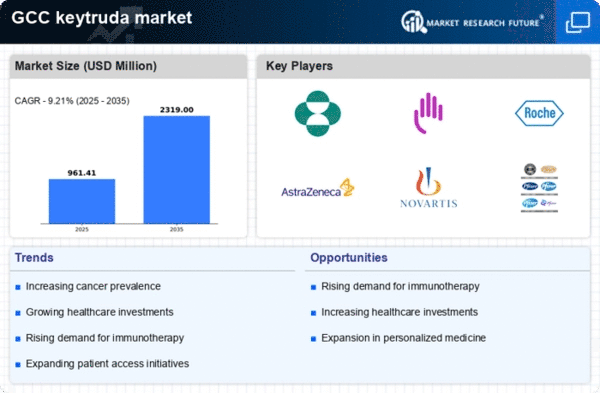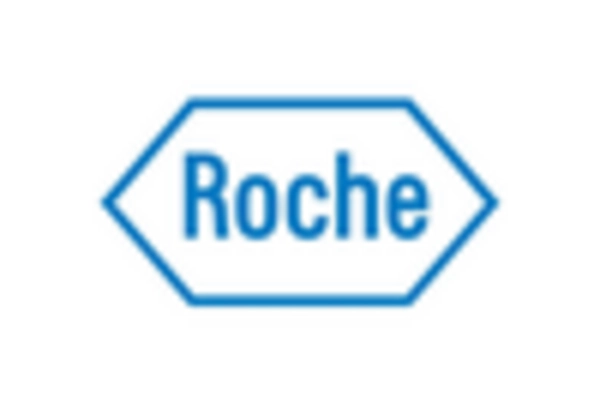Increasing Awareness of Immunotherapy
The rising awareness of immunotherapy as a viable treatment option for various cancers is a crucial driver in the keytruda market. Educational campaigns and outreach programs by healthcare providers and pharmaceutical companies have contributed to a better understanding of the benefits of immunotherapy. This increased awareness is likely to lead to higher patient demand for keytruda, as more individuals seek advanced treatment options. In the GCC, the market for immunotherapy is projected to grow at a CAGR of approximately 15% over the next five years, indicating a robust interest in innovative cancer therapies. As patients become more informed about their treatment choices, the keytruda market is expected to expand significantly, driven by this heightened awareness.
Rising Incidence of Targetable Cancers
The rising incidence of targetable cancers, such as melanoma and non-small cell lung cancer, is a significant driver for the keytruda market. As the prevalence of these cancers increases in the GCC, the demand for effective treatment options like keytruda is likely to rise correspondingly. Recent statistics indicate that the incidence of melanoma has increased by 25% in the region over the last five years. This trend suggests a growing patient population that may benefit from immunotherapy. Consequently, pharmaceutical companies are focusing their efforts on expanding the availability of keytruda, anticipating a surge in demand driven by the increasing number of patients diagnosed with targetable cancers.
Government Initiatives for Cancer Treatment
Government initiatives aimed at improving cancer treatment accessibility play a pivotal role in shaping the keytruda market. In the GCC, various health ministries are implementing policies to subsidize cancer treatments, including immunotherapies like keytruda. These initiatives are designed to alleviate the financial burden on patients and ensure that cutting-edge therapies are available to a broader population. For instance, recent reports indicate that government spending on cancer care in the region has increased by over 20% in the past two years. Such financial support not only enhances patient access but also stimulates market growth, as more healthcare facilities adopt keytruda as a standard treatment option.
Technological Advancements in Cancer Diagnostics
Technological advancements in cancer diagnostics are significantly influencing the keytruda market. Innovations such as next-generation sequencing and liquid biopsies enable earlier and more accurate cancer detection, which is essential for effective treatment planning. As diagnostic technologies improve, healthcare providers in the GCC are increasingly identifying patients who are likely to benefit from keytruda. This trend is expected to enhance patient outcomes and drive demand for the drug. The integration of advanced diagnostic tools is projected to increase the number of patients eligible for immunotherapy by approximately 30% in the coming years, thereby expanding the keytruda market.
Collaborations Between Pharmaceutical Companies and Healthcare Providers
Collaborations between pharmaceutical companies and healthcare providers are emerging as a vital driver in the keytruda market. These partnerships facilitate the sharing of knowledge, resources, and clinical data, which can enhance the understanding of keytruda's efficacy and safety. In the GCC, several initiatives have been launched to promote clinical trials and research collaborations, aimed at optimizing treatment protocols for keytruda. Such collaborations are expected to lead to improved patient outcomes and increased adoption of the drug. Furthermore, as more healthcare providers gain access to the latest research findings, the likelihood of integrating keytruda into standard treatment regimens is anticipated to rise, thereby bolstering the market.
















